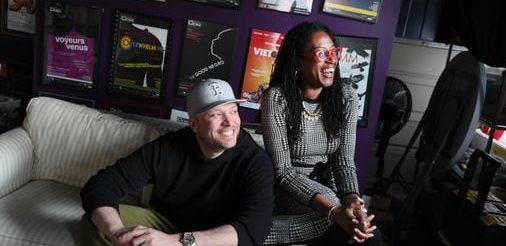As Company One launches its 25th season, its reputation for innovation is reaping rewards – The Boston Globe

Company One Theatre kicks off its 25th season this month in an enviable position. While many theater companies in Boston and across the country are struggling to meet budget shortfalls and reengage audiences post-pandemic, tickets to Company One’s three productions will all be free or pay-what-you-want, even as it expands its outreach by hosting its “Better Future Series” at Boston’s City Hall Plaza Pavilion. The flexibility is the result of partnerships built over the company’s quarter-century, says cofounder Shawn LaCount, including work with the City of Boston, which is providing a $500,000 Neighborhood and Downtown Activation Fund grant this year to help mount a production in the Strand Theatre in Dorchester as well as the events at City Hall, and the Boston Public Library, which is providing $250,000 for Rabb Hall performances over the next three years. Company One is also receiving $500,000 over two years from the Andrew W. Mellon Foundation for its participation in the “Future of the American Theatre Cohort,” a coalition of five companies across the country that are thinking differently about theater. (The Mellon grant for the cohort totals $2.5 million.) From the start of Company One, LaCount and his cofounders — Summer L. Williams, Mark Abby VanDerzee, and Mason Sand — focused on expanding the artistic offerings in Boston to reflect a much wider range of voices and stories. Advertisement “We believe in theater as ‘public art for public good,’” says LaCount. “That means we offer robust residencies for artists, partner with organizations that serve the public good, work in classrooms, and produce work in civic spaces — places that are non-elitist and open to the community.” Company One’s community connections and commitment to nurturing hot-topic playwrights telling stories with a social justice bent have led to more than 90 productions and digital events. Its efforts, says LaCount, have also created younger and more diverse audiences than most other theater companies in Boston. Best of all, he says, 50 percent of its audiences are first-time theatergoers. Advertisement “When we looked at who we are making the work for, the possibilities for storytelling grew broader, and our work became more dynamic,” he says. “We have been very intentional in making our work more accessible, available, and as open as possible,” says Williams, who is also the company’s associate artistic director. “The Boston Public Library and the Strand Theatre are where people are. When we come closer to people, and share a space for a period of time, it changes the way you look at a story.” Williams and LaCount also say their company’s artist-driven focus is part of their secret sauce. “The other small-to-midsize companies we are partnering with the Mellon Foundation — Cleveland Public Theatre, Crowded Fire Theater in San Francisco, Mosaic Theater Company in Washington, D.C, and Perseverance Theatre in Juneau, Alaska — are all ‘new play’ theater companies, who are also intentionally multiracial and have unique business models,” he says. “We started talking about how we might work together last summer and have been developing a plan to share resources, build audiences, and develop new theater.” Says Williams, “We’ve produced plays with a national focus and a hyper-local focus, but we’re always looking at theater as a ‘felt experience’ that helps us see and understand the community around us and how to find a new path forward.” Advertisement Company One’s commitment to new play development includes C1 PlayLab Circuit, a combination of writing opportunities for individuals at any level of experience. “The PlayLab experiences are designed to provide support for the development of voices,” says Williams. “Landing a production is not the goal.” That said, Company One’s nurturing approach has encouraged emerging playwrights, and all three of this anniversary season’s productions are written by PlayLab alums. They include: The world premiere of “The Interrobangers,” a mystery inspired by “Scooby Doo” by M Sloth Levine, produced in partnership with the Boston Public Library and The Theater Offensive at Rabb Hall, Boston Public Library Copley Branch, Jan. 26-Feb. 24. The world premiere of “Morning, Noon, and Night,” about mother-daughter tension, by Kirsten Greenidge, in partnership with Boston University’s College of Arts, at the BCA Plaza Theatre, April 26-May 25. The Boston premiere of “Hoops,” an adaptation of interviews with women that celebrates hoop earrings as a symbol of self-expression, by Eliana Pipes, in partnership with the Mayor’s Office of Arts & Culture and Boston Playwrights Theatre, at the Strand Theatre, July 12-Aug. 10. And while Levine and Pipes are relative newcomers, Williams says commissioning Greenidge’s new play was important to the company. “Kirsten and I have grown up together, as artists and in the company,” says Williams. “This is an opportunity for her to experiment with the container for the play [three scenes: morning, noon, and night] in just 90 minutes. We’re still developing it, which is exciting and fun.” Greenidge, whose work has been produced in theaters across the country, and whose “Milk Like Sugar” earned an Obie award in 2012, has had five of her full-length plays produced at Company One. She was the HowlRound/Mellon Foundation artist-in-residence at Company One for six years. “The goal of that program,” says LaCount, “was to keep playwrights employed by having the theater companies hire them as permanent members of their staff. We were one of the only ones that kept her on staff.” Terry Byrne can be reached at trbyrne818@ gmail.com
